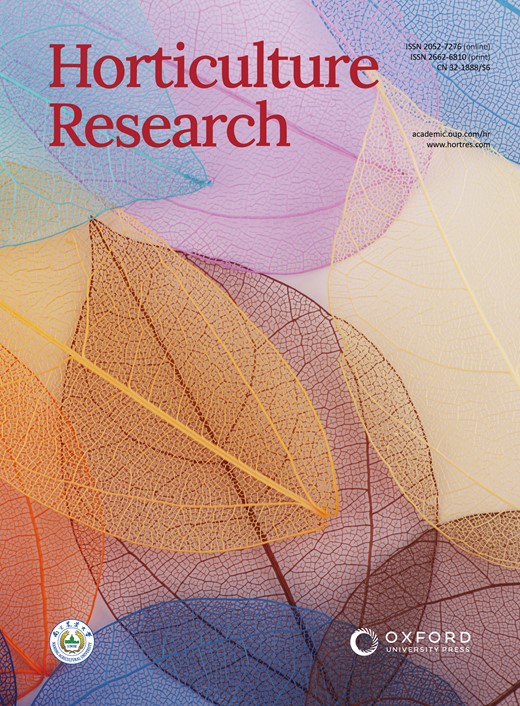响应高环境温度的 OfWRKY17-OfC3H49 模块通过抑制桂花中 OfSOC1B 的表达延迟开花
IF 8.5
1区 农林科学
Q1 Agricultural and Biological Sciences
引用次数: 0
摘要
环境温度是调节植物开花过程的关键因素。本研究发现,高环境温度对桂花的开花有抑制作用。然而,其潜在的分子机制仍未完全清楚。通过转录组分析,发现了一种不同表达的 C3H 基因 OfC3H49,该基因受高环境温度诱导。研究证明,OfC3H49 能延迟拟南芥的开花过程,并能下调 O. fragrans胼胝体中开花相关基因的表达。进一步的研究表明,OfC3H49 作为一种转录抑制因子,直接抑制了 OfSOC1B 的表达,从而导致开花时间延迟。此外,研究还发现了一种 WRKY 转录因子 OfWRKY17,它能对高环境温度做出反应,直接与 OfC3H49 启动子结合并增强 OfC3H49 的表达。在拟南芥中过表达 OfWRKY17 会导致开花显著延迟,并诱导 O. fragrans 胼胝体中 OfC3H49 的表达。总之,我们的研究结果界定了一个调控模块--OfWRKY17-OfC3H49,它被高环境温度激活,并通过抑制 O. fragrans 中 OfSOC1B 的表达发挥开花负调控因子的功能。这项研究为了解环境温度介导的花期调控的分子机制提供了新的视角,有助于开发芳香木的分子育种策略。本文章由计算机程序翻译,如有差异,请以英文原文为准。
OfWRKY17-OfC3H49 module responding to high ambient temperature delays flowering via inhibiting OfSOC1B expression in Osmanthus fragrans
Ambient temperature is a pivotal factor in the regulation of the flowering process in plants. In this study, we found that high ambient temperature exerts an inhibitory effect on the flowering of Osmanthus fragrans “Sjigui”. However, the underlying molecular mechanisms remain not fully understood. Through transcriptome analysis, a differently expressed C3H gene OfC3H49 was identified, which is induced by high ambient temperature. OfC3H49 was demonstrated to delay the flowering process of Arabidopsis and to downregulate the expression of flowering-related genes in O. fragrans calli. Further investigation indicates that OfC3H49 as a transcriptional repressor, directly suppresses the expression of the OfSOC1B thereby causing a delay in flowering time. Furthermore, a WRKY transcription factor, OfWRKY17, was identified to be responsive to high ambient temperature, directly binding to the OfC3H49 promoter and enhance OfC3H49 expression. Overexpression of OfWRKY17 in Arabidopsis resulted in a significant delay in flowering and induced the expression of OfC3H49 in O. fragrans calli. Collectively, our findings delineate a regulatory module, OfWRKY17-OfC3H49, which is activated by high ambient temperature and functions as a negative regulator of flowering by suppressing the expression of OfSOC1B in O. fragrans. This study provides novel insights into the molecular mechanisms involved in ambient temperature-mediated flowering control and contributes to the development of molecular breeding strategies for O. fragrans.
求助全文
通过发布文献求助,成功后即可免费获取论文全文。
去求助
来源期刊

Horticulture Research
Biochemistry, Genetics and Molecular Biology-Biochemistry
CiteScore
11.20
自引率
6.90%
发文量
367
审稿时长
20 weeks
期刊介绍:
Horticulture Research, an open access journal affiliated with Nanjing Agricultural University, has achieved the prestigious ranking of number one in the Horticulture category of the Journal Citation Reports ™ from Clarivate, 2022. As a leading publication in the field, the journal is dedicated to disseminating original research articles, comprehensive reviews, insightful perspectives, thought-provoking comments, and valuable correspondence articles and letters to the editor. Its scope encompasses all vital aspects of horticultural plants and disciplines, such as biotechnology, breeding, cellular and molecular biology, evolution, genetics, inter-species interactions, physiology, and the origination and domestication of crops.
 求助内容:
求助内容: 应助结果提醒方式:
应助结果提醒方式:


